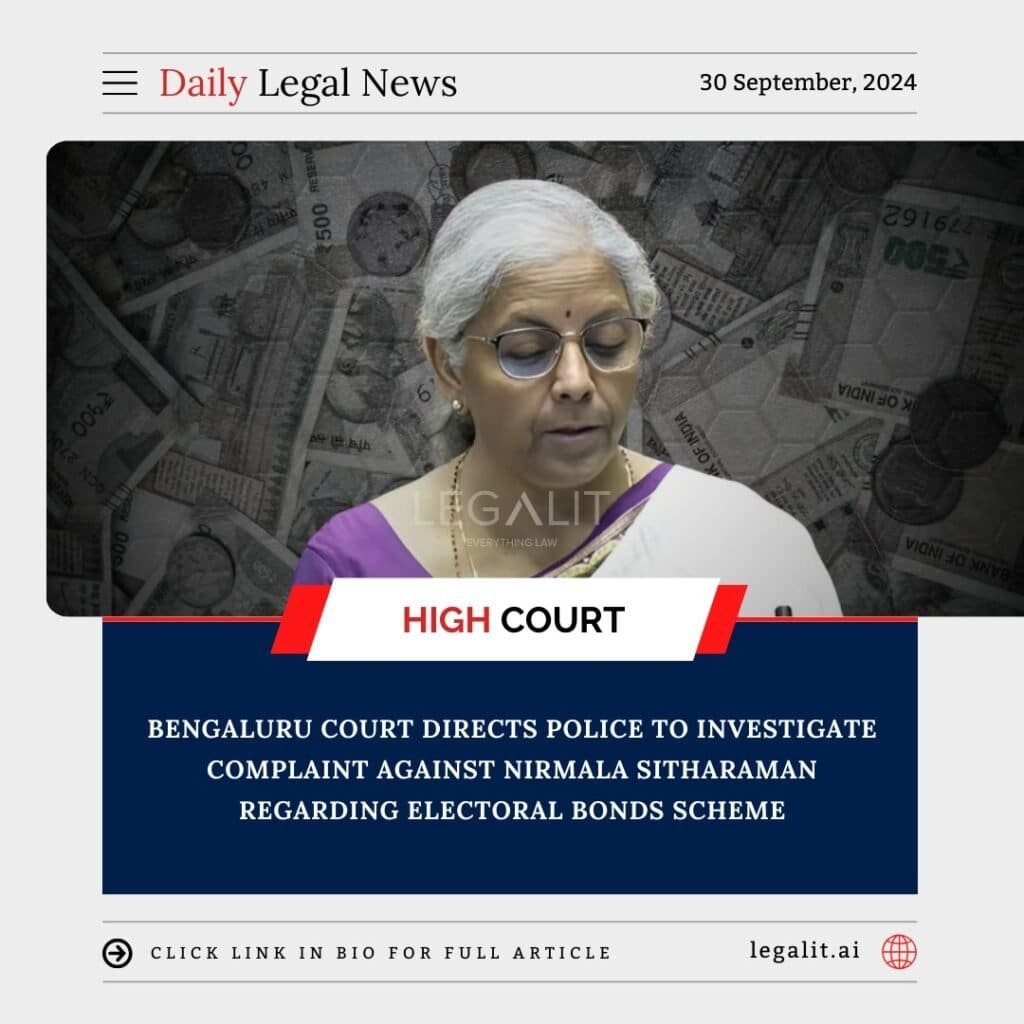
A recent ruling by a Bengaluru court has sent ripples through the political landscape as it directed local police to investigate a complaint filed against Nirmala Sitharaman, the Union Finance Minister, concerning the controversial Electoral Bonds Scheme. This decision underscores the ongoing debates surrounding electoral financing in India and raises questions about transparency and accountability in political funding.
1. Understanding the Electoral Bonds Scheme
The Electoral Bonds Scheme, introduced in 2018 by the Government of India, allows individuals and corporate entities to donate money to political parties through bonds that can be purchased from designated State Bank of India branches. The key features of the scheme include:
- Anonymity: Donors can remain anonymous, as the names of those purchasing electoral bonds are not made public. This has drawn criticism from various quarters advocating for transparency in political funding.
- Unlimited Donations: There are no limits on the amount that can be donated through electoral bonds, raising concerns about the influence of money in politics.
- Political Party Benefits: Only registered political parties that secure at least one percent of the votes in the last general election are eligible to redeem these bonds.
2. The Complaint Against Nirmala Sitharaman
The complaint against Sitharaman alleges misuse of the Electoral Bonds Scheme and its implications on electoral integrity. The specifics of the complaint highlight concerns about:
- Lack of Transparency: Critics argue that the scheme facilitates unaccounted and untraceable funding, undermining democratic processes.
- Potential Abuse of Power: The complaint suggests that the financial mechanisms established through this scheme could be exploited for partisan advantages, favoring certain political entities over others.
- Legal and Ethical Concerns: The allegations question the legality of the scheme and its alignment with established electoral laws, pointing to possible violations by public officials.
3. Court’s Ruling and Implications
The Bengaluru court’s decision to forward the complaint to police for investigation signifies a serious consideration of the issues raised regarding electoral bonds. The implications of this ruling are significant:
- Investigative Procedures: The police will be required to assess the validity of the allegations, potentially leading to deeper scrutiny of electoral funding practices and the role of government officials in regulating them.
- Political Ramifications: This investigation could have broader political implications, particularly in the context of the upcoming elections, as issues of financial misconduct and transparency come to the forefront.
- Public Interest: The court’s action reflects a growing public interest in accountability and transparency in political financing, as citizens demand clearer insight into how political parties are funded.
4. Calls for Reform
The ongoing debates surrounding the Electoral Bonds Scheme have led to calls for reform in the political funding landscape:
- Enhanced Transparency: Advocates argue for a complete overhaul of the scheme to ensure that all political donations are made transparent, allowing voters to understand who funds political parties.
- Limiting Corporate Influence: There is a growing sentiment that corporate donations can unduly influence political decisions, prompting calls for stricter regulations on corporate financing in elections.
- Strengthening Democracy: Ensuring that electoral processes are free from undue financial influence is essential for the health of democracy in India.
Conclusion
The Bengaluru court’s directive to investigate the complaint against Nirmala Sitharaman regarding the Electoral Bonds Scheme marks a significant moment in the ongoing dialogue about political financing in India. As the investigation unfolds, it will be crucial to monitor how these legal proceedings influence the broader discussions on electoral transparency and integrity. Ultimately, ensuring that the electoral process remains fair and accountable is fundamental to strengthening democratic practices in the country.
[ajax_Load_more]